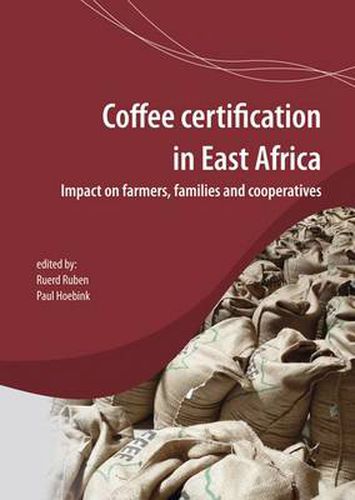Readings Newsletter
Become a Readings Member to make your shopping experience even easier.
Sign in or sign up for free!
You’re not far away from qualifying for FREE standard shipping within Australia
You’ve qualified for FREE standard shipping within Australia
The cart is loading…






Certification of coffee producers is frequently suggested as a promising strategy for improving the position of smallholder farmers in the market. After the launch of the first Fairtrade label in 1988, several other standards have been promoted either by voluntary agencies (Utz-certified) or by private coffee companies. Each coffee label relies on different strategies for enhancing sustainable production and responsible trade.Coffee certification in East Africa is of a rather recent nature but has been rapidly expanding, representing currently 26 percent of the world’s sustainable certified coffee supply. Marketing channels, cooperative organisation and household structures show notable differences between Kenya, Uganda and Ethiopia. Empirical studies on the effects of standards for smallholders are scarce.This book intends to deepen our understanding on the role and functions of coffee certification regimes, based on three innovative approaches: (1) longitudinal field survey data capturing changes in coffee farming systems and effects on household welfare; (2) in-depth interviews and behavioural experiments regarding risk attitudes, trust and investments at cooperative level; and (3) detailed discourse analyses regarding gender roles and female bargaining power within coffee households. The chapters included in this book provide new and original evidence about the impact of coffee certification based on large-scale field surveys and in-depth interviews.
$9.00 standard shipping within Australia
FREE standard shipping within Australia for orders over $100.00
Express & International shipping calculated at checkout
Certification of coffee producers is frequently suggested as a promising strategy for improving the position of smallholder farmers in the market. After the launch of the first Fairtrade label in 1988, several other standards have been promoted either by voluntary agencies (Utz-certified) or by private coffee companies. Each coffee label relies on different strategies for enhancing sustainable production and responsible trade.Coffee certification in East Africa is of a rather recent nature but has been rapidly expanding, representing currently 26 percent of the world’s sustainable certified coffee supply. Marketing channels, cooperative organisation and household structures show notable differences between Kenya, Uganda and Ethiopia. Empirical studies on the effects of standards for smallholders are scarce.This book intends to deepen our understanding on the role and functions of coffee certification regimes, based on three innovative approaches: (1) longitudinal field survey data capturing changes in coffee farming systems and effects on household welfare; (2) in-depth interviews and behavioural experiments regarding risk attitudes, trust and investments at cooperative level; and (3) detailed discourse analyses regarding gender roles and female bargaining power within coffee households. The chapters included in this book provide new and original evidence about the impact of coffee certification based on large-scale field surveys and in-depth interviews.